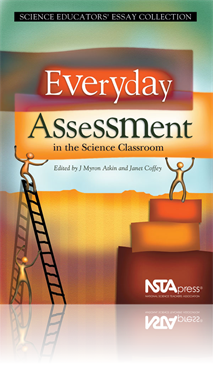All Resources
Book Chapter
Congratulations! You have secured a position to teach the fascinating world of science to middle school students! Science to young adolescents!?!?...
Book Chapter
Perhaps the most important skill a good teacher should possess is the ability to control students. A teacher who can devise fascinating and unique lesson plans for her classroom is useless if she can't get the kids to sit down and listen to her inst...
Book Chapter
Using Your Community Resources
Within the field of education, it is important for communities to take an active role in developing relationships with the local schools and learning facilities. One good reason in particular is that children and adolescents need to feel that they a...
Book Chapter
Teaming is a method of grouping students so they share the same set of teachers for their core subject areas—science, math, language arts, social studies, and sometimes physical education and health. Most often, teams are created when an entire gr...
Book Chapter
Our lives are ones of uncertainty and surprise, yin and yang existences. Some things we can control and others we are powerless to command, even with the best intentions. Teachers are not exempt from emergencies, jury duty, and illness. Luckily, m...
Book Chapter
Front-page articles in science and education periodicals and journals give voice to the growing concern that scores on nationwide science exams have either declined or, at best, have had a minute increase even after several years of pushing for bette...
Book Chapter
Whether your assigned classroom is for science labs or there is a specific lab area shared among several teachers, you need to set up properly for group experiments and other hands-on activities. There are several ways to set up lab groups in various...
Book Chapter
Cooperative Learning and Assessment
Cooperative learning in its simplest sense is two or more students working together on an assignment. In an expanded definition, cooperative learning becomes an opportunity for students to interact with one another intellectually and socially under ...
Book Chapter
Writing, as we all know, is an integral part of any discipline. And, because of the important role that writing up lab reports and research plays in the field of science, you must help your students work on writing throughout the year. This chapter...
Book Chapter
Adapting Labs and Troubleshooting
A great deal of information is available on how children learn—brain research, multiple intelligence aspects, concrete versus abstract thinking, environmental stimuli, and so on—but one key feature can be gleaned from all of the studies, and that...
Book Chapter
One common misconception in the middle school science classroom is that students magically will know how to do many of the seemingly easy tasks teachers assign. In reality, even the simple direction of using written resources to gain background info...
Book Chapter
One of the most challenging activities in the middle school science lab is taking measurements. A simple ruler can send students into a questioning mob around a teacher, not unlike a shark-feeding frenzy. Student activities that require using and r...
Book Chapter
This section includes resources that any new teacher would want to have at their fingertips. It offers reproducible lists, quizzes, and forms. These resources will assist in making the first year of teaching a smooth and successful one....
Book Chapter
This section offers practical resources that will be quite valuable during those first few months of teaching middle school science. Here you will find recipes that include salt crystals, culture medium, fun putty, and the ever-popular "oobleck". T...
Book Chapter
The Importance of Everyday Assessment
Assessment for learning is set in the context of conflicts and synergies with the other purposes of assessments. The core ideas are that it is characterized by the day-to-day use of evidence to guide students’ learning and that everyday practice mu...



